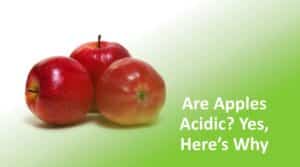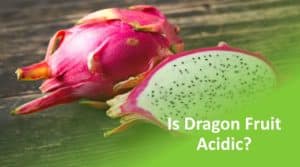Putting a cherry or two on top of your favorite cake, sundae or dessert adds the perfect finishing touch and a delicious dose of sweetness. But, are cherries only good for adding sweetness, or are they sour, as well?
It’s no secret that cherries have long been known to have a relatively tangy and tart flavor profile, which leads many people to wonder what the acidity levels of cherries are and if people who suffer from acid reflux (or GERD) can enjoy them. So, are cherries acidic?
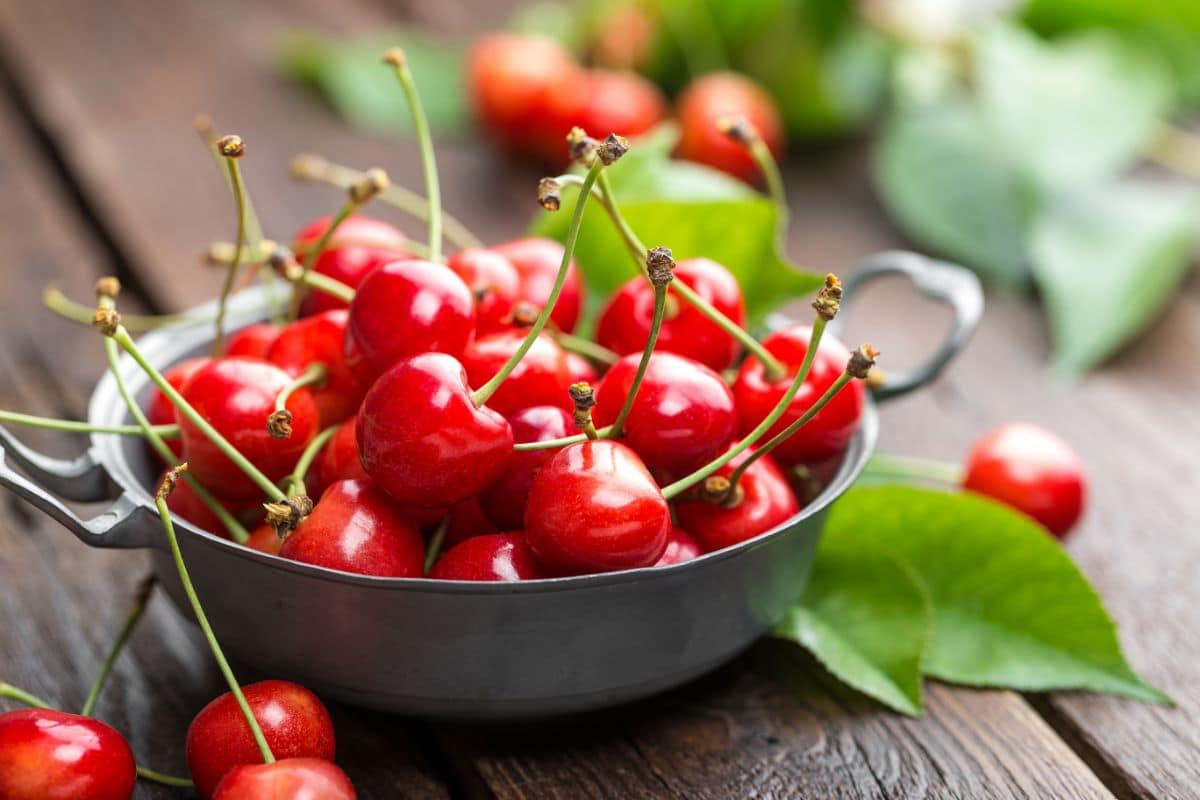
This is where we come in to lend you a helping hand. In this guide, we are going to be taking a closer look at how acidic cherries are, so that you will be able to make a more informed decision about whether they’re going to be a good food option for you.
So, whenever you’re ready, just keep on reading to learn more about how sour cherries are here. Scroll on!
How Acidic Are Cherries?
Even though we know that cherries are a delicious fruit known for offering plenty of juicy sweetness, they do have a tangy and tart flavor profile that leads many people to wonder what the acidity level of cherries is.
Well, to cut a long story short, cherries typically tend to have a pH level that falls within the range of 3.2 to 4.5.
If you weren’t aware, any type of food that has a pH level of under 7.0 is classified as being acidic, so we think it’s safe to say that cherries are most definitely an acidic fruit.
Wondering why cherries are so acidic, though? Generally speaking, cherries are known for containing high levels of vitamin C, which also goes by the name of ascorbic acid.
There are also high levels of pantothenic acid, which are two compounds that are generally responsible for the acidity levels of cherries.
The pH Of Cherries
As we have mentioned in the section above, cherries are considered to be acidic fruit because they have a pH level of under 7.0.
Just to recap, the common acidity levels of cherries are typically between 3.2 to 4.5, which means that cherries contain high levels of acid.
To be more specific, cherries are classed as being one of the most acidic fruits in the world, along with other types of fruit that contain pH levels below 7.0 including limes, pineapples, grapefruits and, of course, lemons!
Interestingly enough, despite the fact that cherries are considered to be very acidic, they do have a very sweet flavor profile which is why they are such a popular fruit to be included in desserts, sundaes and even on top of cakes.
Plus, thanks to their sweetness, cherries are also commonly eaten on their own as a yummy snack.
The Acidity Level Of Cherry Juice
Now that we have learned that cherries themselves are acidic, what about cherry juice? Similar to other types of juicy fruits like oranges and pineapples, many people like to drink the juice on its own.
However, given the fact that cherries are one of the most acidic fruits, does that also mean that cherry juice is acidic, too?
Well, the truth is that, while cherry juice isn’t as acidic (on average) as cherry fruit, it is still a juice that is known for containing relatively high amounts of acid.
On average, the most common pH level for cherry juice is usually anywhere from 3.2 to 3.4.
This means that, while cherry juice might not be as acidic as cherry fruit, it does contain a pH level of below 7.0, which does indeed make it acidic.
So, what makes cherry juice so acidic? Well, similar to the fruit, cherry juice contains a mixture of different acids (primarily, citric acids) that cause the juice to have high levels of acid.
There is also another type of acid in cherry juice known as tartaric, which is a type of acid that can be found present in cherries and cherry juice.
It is a naturally occurring acid, and this type of acid can also be found in many other fruits including grapes, tamarins and even bananas.
As well as tartaric acid, cherry juice also contains relatively high levels of citric acid.
This primarily comes from the high levels of vitamin C that can be found in cherries, and it is an acid that is found in many other “citrus” fruits, including lemon and lime.
Are Cherries Suitable For Those With GERD?
If you or someone you know suffers from GERD (which can also commonly be referred to as acid reflux) then the good news is that, for the most part, cherries are typically considered to be a safe food for people who suffer with this issue to eat.
When eaten in moderation, it is highly unlikely that cherries will cause symptoms to worsen, but it is important to note that this likely won’t be the case for everyone.
For those who suffer from relatively intense GERD symptoms, there might be a greater risk of cherries triggering an acid reflux attack.
Due to this, if you are someone who suffers from GERD and you want to be able to enjoy cherries as part of your everyday, balanced diet, you should make sure that you are eating cherries (as well as other types of foods that contain pH levels of below 7.0) in moderation in order to lower the chances of you having a GERD flare-up.
Along with this, it is also worth keeping in mind that there is much debate surrounding whether cherries are, in fact, suitable for those who struggle with GERD – especially with regard to sweet cherries versus cherries that are sour or tart.
On one hand, there are some people who believe that cherries are beneficial to helping the body regulate its ability to digest acidic foods, while other people find that cherries that are sour or tart have a much greater risk of causing symptoms to intensify.
All this being said, if you are someone who has GERD (or you know someone who does) it is highly recommended that you introduce cherries slowly into your diet so that you will be able to see how your body reacts to small amounts of the acid present in cherries.
Along with all of the above, it is also important to keep in mind that there can be a difference between raw or cooked fruit – and cherries are certainly no exception to this.
For instance, there are some people who suffer from acid reflux that find that they are only able to consume acidic fruits like cherries when they are boiled or made into a jam.
That being said, if you are someone who suffers from gastroesophageal reflux disease symptoms from certain foods, then you might want to experiment with the different ways that you can eat cherries, just to see if there is a certain type of cherry that works best for you.
Of course, if you find that you can’t eat cherries at all, then you might want to try some other types of fruit that aren’t known for triggering acid reflux like melons, pears, and bananas.
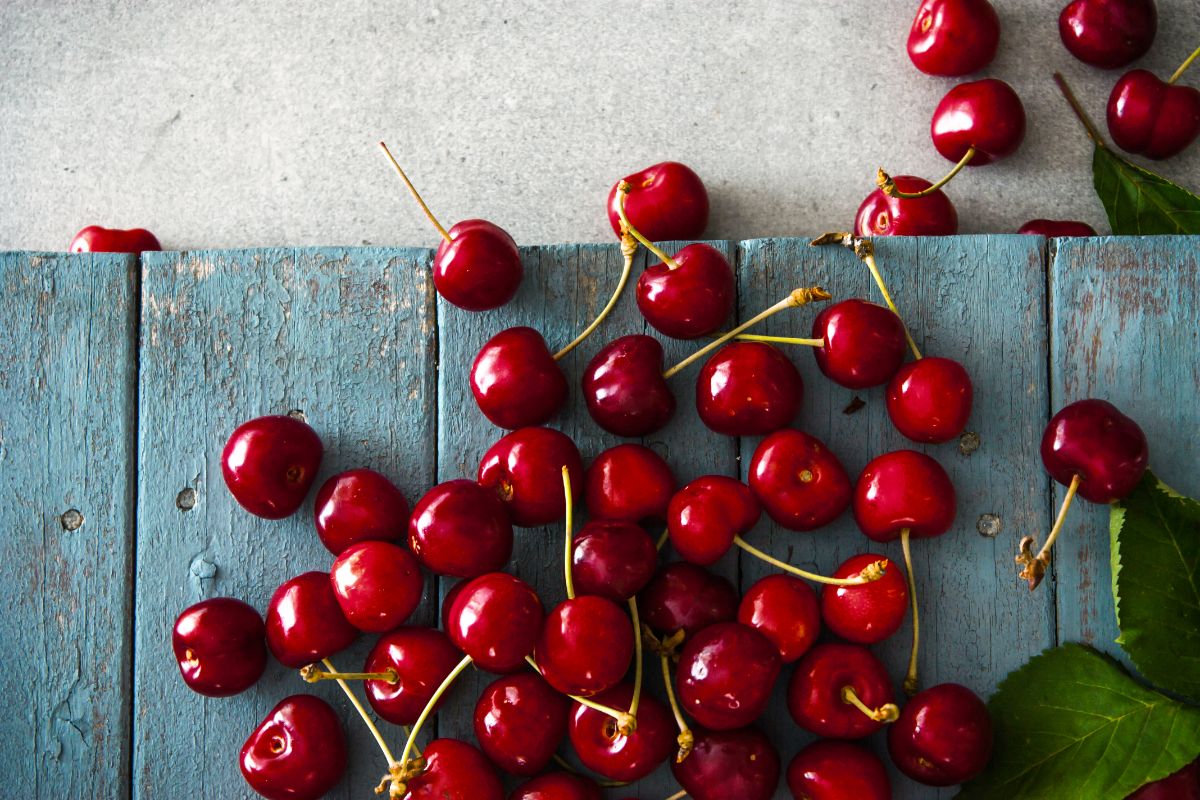
Different Types Of Cherries And Acidity Levels
As we have mentioned in a previous point above, there are many different types of cherries, which means that they can vary somewhat in pH level.
To help give you a better idea of what the different types of cherry (as well as what their acidity levels are) we are going to be providing you with a helpful breakdown of them below.
This will help you make a more informed decision about which type of cherries might be suitable for you:
| Common Cherry Varieties | pH Levels |
| Napoleon Cherries | 3.46 |
| Rivan Cherries | 3.20 |
| Johanna Type 1 Cherries | 3.25 |
| Johanna Type 2 Cherries | 3.20 |
| Kunzes Kirsche Cherries | 3.25 |
| Kordia Cherries | 3.10 |
| Merton Premier Cherries | 3.42 |
| Bur lat Cherries | 3.30 |
| Schneider’s Spate Cherries | 3.92 |
| Bianca Cherries | 3.30 |
| Summit Cherries | 3.45 |
Nutritional Information Of Cherries
Cherries are packed full to the brim with healthy nutrients that are essential to the body.
Thanks to this, despite the fact that cherries do contain high amounts of acid, they are also considered to be a great food source for anyone looking to get all of their vitamins and minerals.
Below, let’s take a look at some of the main nutrients that you can expect to get from incorporating cherries into your everyday diet. Let’s explore them below:
Vitamin C
First up, cherries are known for being an excellent source of vitamin C, which is one of the main reasons why they contain such high levels of acid! Vitamin C is essential to maintaining healthy skin, blood vessels, cartilage and even bones.
Plus, along with that, vitamin C also has the ability to support wound healing in the body, too.
As well as that, it has also been suggested that vitamin C can help to encourage healthy blood pressure levels in the body, as well as boost immunity and prevent iron deficiency.
Magnesium
Along with vitamin C, cherries are also considered to be a great source of magnesium.
Magnesium is known for offering a multitude of health benefits, including the ability to improve the quality of sleep, lower blood pressure in the body and even help to encourage an increased sense of wellbeing and more positive moods.
Potassium
Potassium is another nutrient that is found in all types of cherries, including sweet and tart cherries.
Potassium is essential for the body because it has the ability to help maintain healthy levels of fluid inside our cells.
As well as this, potassium also has the ability to help support normal blood pressure, as well as encourage the body to contract its muscles effectively.
Protein
Along with all of the other nutrients that we have mentioned, cherries are also known for being a great source of protein.
Now, you might not necessarily think that cherries would be a good source of protein from first impressions, but cherries are actually pretty high in protein!
Protein is another essential nutrient for the body, as it has the ability to help maintain healthy weight, curb hunger, reduce muscle loss as well as help to aid in the recovery of damaged or injured muscles.
Calcium
Last but certainly not least, cherries are also full to the brim with calcium! Calcium is essential to the body because it helps to not only build strong bones, but maintain them, too!
Along with this, the heart, muscles and the nerves also need calcium in order to function properly, which is why it is so important to make sure that you are getting enough of it.
Plus, given the fact that cherries are so full of calcium, it means that cherries are a great food choice for anyone that needs to get calcium from food sources other than traditional options such as dairy.
Not only that, but it is also worth noting that high levels of calcium can be found across all types of different cherries, including sweet cherries.
So, if you are someone who is conscious about eating cherries that aren’t overly high in acidity due to gastric acid issues, then you can have the peace of mind that you’ll still be eating cherries that will be a great source of calcium.
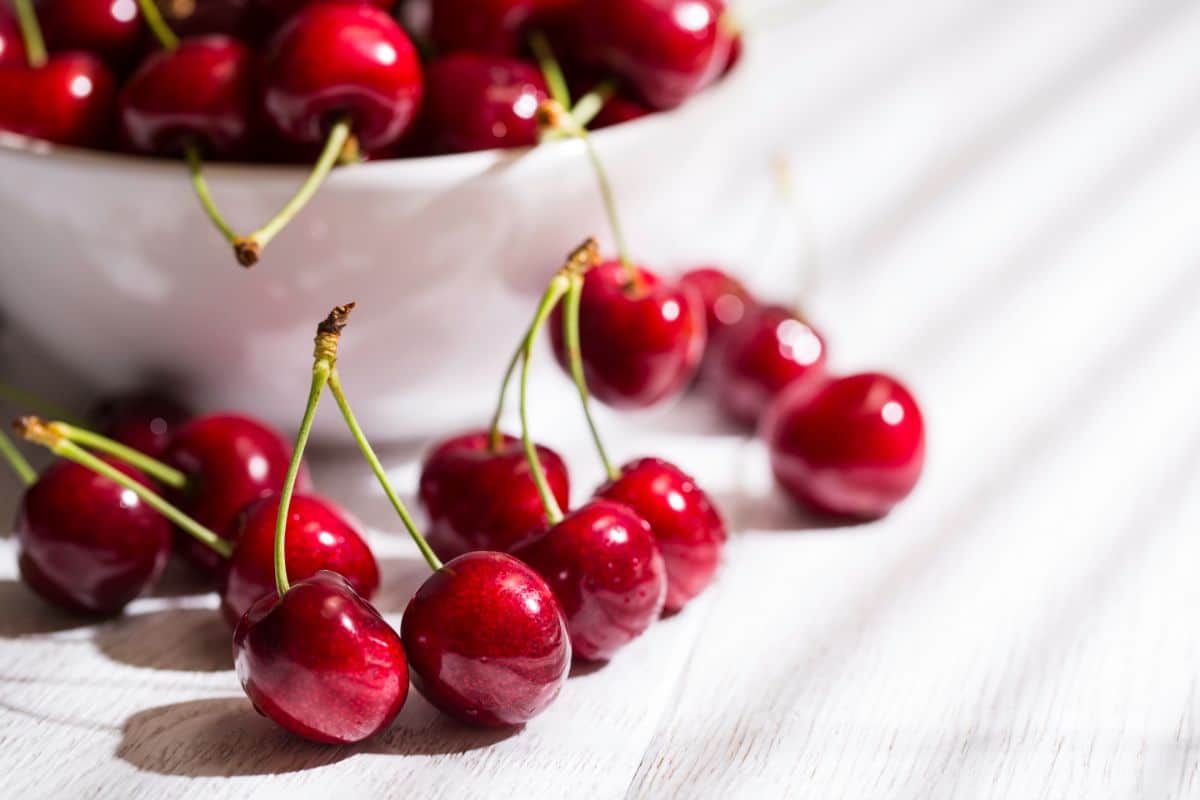
Fruits Suitable For Gastric Acid
If you suffer from GERD or have general acid reflux symptoms, then you might want to consider eating fruits that are suitable for acid reflux.
Let’s check out some of the best alternatives to cherries (and other types of fruit high in pH levels) below.
Bananas
One of the first fruits that are considered to be suitable for those that suffer from GERD/acid reflux is bananas.
Despite the fact that bananas do have acid, the acid present in bananas is relatively low, which means that they are deemed to be suitable for those that have acid reflux or GERD.
As well as this, it is also worth noting that bananas are considered to be beneficial to those that suffer from gastric acid issues, due to the way that bananas can assist in balancing the acid in the stomach.
This is something to keep in mind if you are interested in incorporating more fruits into your diet, which can help to regulate the acid in your body and lower the chance of flare-ups.
Melons
If you’re on the search for a fruit that is going to be good for you while also containing low levels of acid, then we recommend that you incorporate melons in your diet!
Similar to bananas, melons are known to be very beneficial to those that suffer from gastric acid issues, as the alkaline present in melons can help to balance acidity levels in the body.
Pears
Next up? Pears! One of the best types of fruit that you can enjoy that contains low amounts of acid is pear.
Unlike fruits that are high in acidity levels like cherries, lemons and even lime – pears feature low levels of acid that makes them a great option for anyone that wants to enjoy plenty of tasty fruit without having to worry about dealing with any unwanted GERD or acid reflux flare-ups.
Besides that, it’s also worth mentioning that pears are also commonly-used as an alternative to cherries in many dessert recipes.
Thanks to this, if you are someone that is on the lookout for fruit that is going to be suitable for helping to regulate stomach acids rather than trigger them – you’ll be making the right choice to incorporate more pear into your diets, especially when it comes to sweet treats!
Wrapping Up
You’ve reached the end of our guide to cherries and their acidity levels.
Now that you have taken the time to read through this post, we hope that you now have a much better understanding of what the various pH levels of cherries are, as well as whether they are suitable for those with acid reflux issues.
Bye for now, and thanks for reading!
Frequently Asked Questions
As we have mentioned in a previous point in this post, there are many different types of cherries that you should be aware of. From sour cherries all the way to sweet cherries and, of course, tart cherries!
For the most part, tart cherries are significantly higher in pH levels than other types of cherries, which is something to keep in mind if you are worried about how much acid you are consuming.
Even though sweet cherries are nowhere near as acidic as other types of cherries (such as tart cherries) it is worth keeping in mind that dark sweet cherries are still acidic, but not as much as sour or tart cherries.
Wondering why this is? Well, for the most part, dark sweet cherries (as well as sweet cherries, in general) tend to contain lower levels of malic acid, Gallic acid, and anthocyanins than sweet or sour cherries.
For this reason, if you do find yourself enjoying some dark sweet cherries, you should find that they have a sweet flavor profile that isn’t too tangy or sour.
Regardless of which type of cherry variety you are eating, all types of fresh cherries are going to be acidic to some extent.
As we have mentioned in a previous point, the majority of cherries tend to have a pH level that falls in between 3.5 and 4.5, with the actual amount depending on what type of cherry you are eating.
This means that fresh cherries might not be a suitable choice for people with GERD or general acid reflux issues.
It is also worth noting that storing fresh cherries or allowing them to dry out won’t affect the pH levels in any way.
However, you might be able to reduce the acidity levels of cherries by cooking them, which is something to keep in mind.





